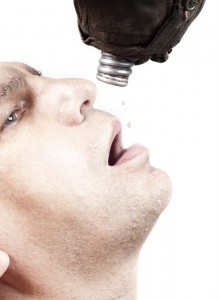 If you’ve ever been thirsty, then you can relate to what a person with dry mouth feels like. Dry mouth, or xerostomia, is a condition that occurs when your salivary glands produce inadequate amounts of saliva to lubricate and moisten your oral tissue. There are as many treatments for xerostomia as there are causes, so treatment depends on an accurate diagnosis. To help you understand the condition of dry mouth a little better, Dr. Newton lists some of its most common causes.
If you’ve ever been thirsty, then you can relate to what a person with dry mouth feels like. Dry mouth, or xerostomia, is a condition that occurs when your salivary glands produce inadequate amounts of saliva to lubricate and moisten your oral tissue. There are as many treatments for xerostomia as there are causes, so treatment depends on an accurate diagnosis. To help you understand the condition of dry mouth a little better, Dr. Newton lists some of its most common causes.
Common Xerostomia Causes
- Dehydration—Because dry mouth is essentially a lack of moisture, the most obvious cause of dry mouth symptoms should be dehydration. Conditions that cause dehydration, such as fever, diarrhea, excessive sweating, vomiting, and blood loss, can all be causes of dry mouth, as well.
- Symptom of disease/infection—A chronic dry mouth can also indicate that your body is battling a disease, or may be a direct result of the disease or infection. Some health issues that are linked to xerostomia include Sjogren’s syndrome, HIV/AIDS, diabetes, anemia, cystic fibrosis, rheumatoid arthritis, hypertension, and Parkinson’s disease, among many others.
- Side effect of medications—Sometimes, the medication that is prescribed to fight an infection or disease can also list xerostomia as a side effect. If you are currently on medication, be sure to inform Dr. Newton to help her better determine the cause of your xerostomia. Dry-mouth inducing medications include those prescribed for depression, anxiety, pain, allergies, colds, obesity, acne, epilepsy, hypertension, diarrhea, nausea, and asthma. Dry mouth can also result if you take muscle relaxants and sedatives.
- Lifestyle—Perhaps you can help treat your dry mouth condition simply by changing a few lifestyle choices. For instance, smoking or chewing tobacco can inhibit saliva production and facilitate dry mouth. So can constantly breathing with your mouth open.
Although occasional dry mouth due to thirst or a vigorous sweating session may not seem very worrisome, it can be when your condition is chronic. Dry mouth can contribute to oral health issues such as gum disease, as well as prevent you from ingesting enough nutrients due to difficulty chewing and swallowing. If you exhibit the signs of xerostomia, schedule an appointment with Dr. Newton at our Celina dentist office by calling (214) 851-0130. We serve patients of all ages from Celina, Prosper, McKinney, Frisco, Anna, Pilot Point, and the surrounding areas.

Recent Comments